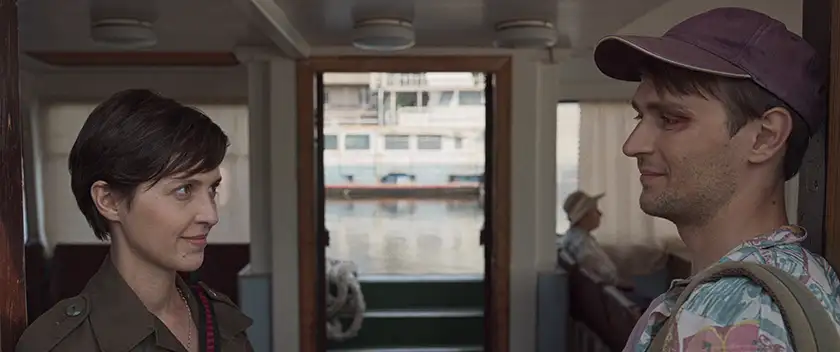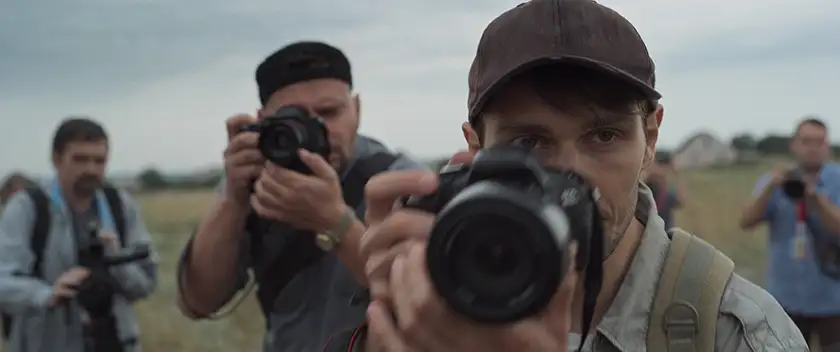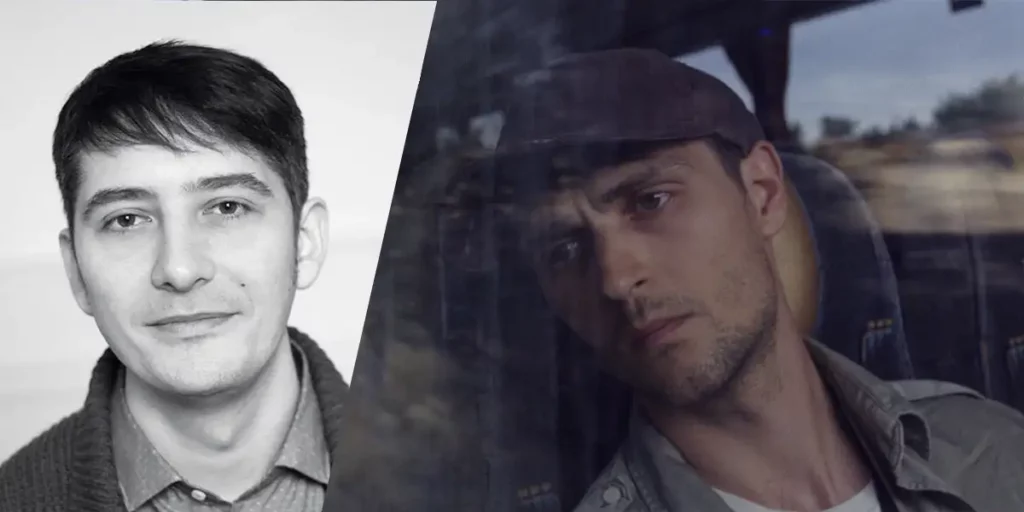We interview The Editorial Office (Redaktsiya) writer-director Roman Bondarchuk about shooting the film, the Berlin premiere, the story he wants to tell, and more.
The Editorial Office (Redaktsiya), from writer-director Roman Bondarchuk (and co-writers Dar’ya Averchenko and Alla Tyutyunnik), revolves around a biologist named Yura (Dmytro Bahnenko) whose life is one day turned upside down when he unexpectedly witnesses arson. Yura, who was in a car with his colleague Mykhailo (Oleksandr Shmal), driving through the Ukrainian Oleshky Sands National Nature Park when it happened, is even more puzzled to discover that, the day after, Mykhailo has disappeared. Not only that, but no newspapers seem interested in publishing his story, more preoccupied with fake news that would engage the public instead.
When he suddenly finds himself hired by a sensationalistic web magazine named Pektoral, Yura’s crazy journey begins, in a film that blends humor and absurdity with extremely timely socio-political commentary, even more so since given the ongoing war in the country. Not only that, this is the first role for real-life journalist Dmytro Bahnenko – or Dima, as he’s known in Ukraine, who is currently fighting in the ongoing war, and this makes The Editorial Office even more relevant as both a time capsule and a warning to the future.
At the Berlin Film Festival, we interview Roman Bondarchuk about the film. Here’s what he told us about the Berlinale premiere, why he made the movie, how the humor was inspired from real events, and what The Editorial Office means to him.
Roman Bondarchuk on Why He Chose to Tell This Story in The Editorial Office
The Editorial Office is about a biologist who becomes a journalist after witnessing something that no one wants to report about. Why did you choose to tell this specific story and start from this premise?
Roman Bondarchuk: Telling the story of a journalist helped us talk about themes of truth and justice. The scientific part came naturally, because we knew we wanted it all to start from forest fires, and we were looking for a guy to naturally be in the forest to take pictures of the arsonists. Who else would be able to be there with a photo camera? And who else would be so dedicated to nature?
I also wanted Yura to be shy and innocent, so that his encounter with these crazy folks in the editorial office would be more dramatic, and more significant. And then, of course, there’s the change of the character himself, from junior researcher who lives with his mum to a real human being. And finally, it’s nice that we could deal with groundhogs and have animals in the film, which are always cute and very cinematic.

I read in the press notes that you grew up in a family of journalists.
R.B.: We always had this idea in mind, to write something about the journalism experience, because we inherited this Soviet tradition where it was like having two different realities: it was allowed to write about one of them, and strictly forbidden to write about the other. My father used to work in a big party newspaper: it was a huge building – it’s actually the same building we used in the film!. They had their own cinema, their own restaurant, their own pneumatic post where you’d put your notes in capsule and send them to other departments on other levels. I was completely fascinated by this place, and I witnessed a lot of crazy stories there.
Most of them were made up, of course. When my father worked as a TV presenter, he never had the correct weather forecast at hand, so he always improvised when he was telling people what the weather would be like the following day. And then he took the job as an editor for the first commercial newspaper in the region – I was 14, back then. I was so impressed by how it all worked: they just rented a few rooms in a hotel, and it was 20 people in two rooms, trying to write content for this commercial newspaper. And the topics they covered for it were spiritual healers, conspiracy theories, horoscopes… It was full of clickbait crazy pieces, which had no connection to reality at all.
To me, it was like a comic book. And, of course, it was much more fascinating than staying at school. I actually quit school to be a photographer and to deliver some images to this newly established newspaper, and that’s how I discovered this world. When the chance came to write about it, we started doing some research: we interviewed most of the local journalists and political advisors, and public figures in the region, to collect more modern events and stories… But we discovered that things didn’t change much: despite some minor changes, the reality is similar to what it was like 10 or 20 years ago, with the medium.
The Humor in The Editorial Office is Inspired from Real Events
I loved the humor in the film! My favorite line is when Yura reads some writing on the wall that reads, “Putin is a d*ckhead,” and an editor tells him that it’s “Hardly a curse word anymore” and “more like a folk song.”
Roman Bondarchuk: I’m happy to hear this, as it means that it’s universal enough! We are working hard on the subtitles to deliver these messages and the humor to international audiences. [laughs] The folk song is a real, existing folk song! If you look at the top Ukraine chart on Spotify, you’ll listen to a lot of swearing directed at Russians and Putin! It’s a crazy mixture of traditional music culture with swear words and modern political context, and it somehow helps to survive this nightmare with humor.
You also added a mayor who may or may not be in a coma, which I thought was very funny too.
R.B.: That is the most absurd thing about elections I ever witnessed! It actually happened to the mayor of Kharkiv. He fell into a coma right before the election days, and despite that fact, he was still reelected. He officially ruled the city for three months, completely unconscious, and then he passed away. Then there was a Ceremony where half of the city was just queuing up to say goodbye to him, and that felt like a pagan ritual, you know? They blocked the city, and it was so bizarre to me because he was just an average person.
When I told our Czech co producers about this story, they said they had a very similar case with their Prime Minister, who also fell into a coma and stayed in his position for some period of time. So I realised that it was something I could use. And after that, what was so interesting is that, when the Russians occupied the city, they appointed their own mayor, to rule it. And then, the day after they appointed him, he fell into coma too! That’s how I realised that film can influence reality in the same way that reality can influence film.

Roman Bondarchuk on Working with Non-Professional Actors and Shooting the Film
What was it like to work with non-professional actors?
Roman Bondarchuk: Luckily, we had an opportunity to bring Dmytro to acting classes before the shoot. He had two months of private acting classes, and it helped a lot. But he still hadn’t realized that there would be a filming crew, with 40 people behind him, staring. Of course, the first few days were not that productive, because there are some specific skills that actors have, such as the ability to move from one spot to another while always being in sync with the way the camera is moving, in order to be in the proper light. So it wasn’t just a matter of having him turn into a character, but also also about acquiring very practical skills. You have to feel the camera with your back, if you want to shoot something properly, and Dima was shocked to discover how many people were involved.
But then, Dima and our DOP [Vadym Ilkov] became friends – they still are! – and Vadym gave him some tricks, and we managed to work really well after that. We had a chance to rehearse every scene in location, without makeup, costume, and a big crew: it was just the main characters and some smart phones. So when we were ready to shoot, everyone knew what they were doing. This made it easier, but it was still tricky with the long takes, as everytime something goes on, you have to start again.
The opening scene must have been tricky! You have the long takes, and the scenery is so beautiful too, so you must have had to wait for the right weather.
R.B.: We only had one chance to film that scene, because the location itself was the military polygon. We love the shape of the dunes and the view from there, but when we asked our administration to film there, she said it wouldn’t be possible, because they would be shelling. But somehow, we found out about their schedule, and we knew that we only had two hours with no shelling. So we came in, we shot these two takes, and then they said, “You’re not allowed to stay here anymore.” But yeah, the landscape is beautiful, and it’s not “obvious” beauty, which I love.
Reuniting with the Cast & Crew of The Editorial Office in Berlin
What was the Berlin Film Festival premiere of The Editorial Office like?
Roman Bondarchuk: We had a fantastic evening! More than twenty crew members managed to come, and some of them were displaced, as they are serving in the army. Dmytro Bahnenko, who plays Yura, is in the Assault Brigade. He came to Berlin from Avdiivka, which was nearly surrounded: he was evacuated from the trenches, on the front line, because of this premiere. His ears were still ringing, and he still can’t accept that reality can be so different [in different areas of the world]: we can have a festival here, and such violent fights over there.
It was fantastic to see them all, after this separation: it had been more than two years since we had seen each other. The screening had a therapeutic effect on me – seeing what it was all like before the full scale invasion. It’s a historical document of that period, and it’s about a group of journalists. Journalists aren’t being very responsible in this moment in history, but there are other people who are contributing to the army. Active people are always the minority, in every country, but they’re the ones who can make real change happen.
This interview was edited for length and clarity.
The Editorial Office (Redaktsiya) premiered at the 2024 Berlin Film Festival. Read our review of The Editorial Office (Redaktsiya).

